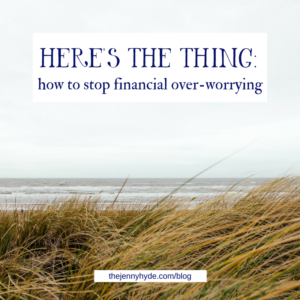 Worrying about finances – do I have enough? how do I get more? how do I spend less? – is the sort of thing that keeps us awake at 3am, tossing and turning, imagining all the wonderful new ways we’re going to make money to that we can be safe.
Worrying about finances – do I have enough? how do I get more? how do I spend less? – is the sort of thing that keeps us awake at 3am, tossing and turning, imagining all the wonderful new ways we’re going to make money to that we can be safe.
In the 21st century, money and having enough taps into our survival instinct as human beings. We know that this is the equivalent of have a safe and secure cave. We use money to buy food and the fundamental things we need to live. So of course, that ultimate survival part of our brain worries about it.
Here’s something I’ve noticed: yes, there’s a need to plan finances and be responsible. But there’s also a need to change the way we view money in our small businesses (so linked to putting bread on the table tomorrow).
When we believe that there fundamentally isn’t enough money for us to have everything we need, and perhaps some things we want, we stress ourselves out and, somehow, make that come true.
We get caught up in doubt about our product or service offering. Perhaps we over-invest in ideas because we need something to work, not realising that we could have just invested fully in one idea that would come through. The worry about having enough means we rush products to market before they’re ready, and then we have a lower return on investment.
Here’s the thing
I wanted to share a few pointers on being happier with your finances. These aren’t the sorts of things your accountant is going to tell you, but they make a big difference to me.
Connect with the reality of your finances regularly – every day if possible. Whether that means looking at your bank balance or your accounting software, or your own spreadsheet, take a moment each day or every other day to get a good realistic look at what you’ve got right now. Having a firm grasp on reality helps us make good decisions.
Change the story you tell yourself about money. Consciously move from ‘Oh help, that’s not enough. I’m not doing very well. I’m going to struggle to get by’ to ‘That’s less than I would like, but it’s plenty to see me through right now. I’ve got plenty of potential, and I’m determined to prioritise the things I really need and want.’ Once you start thinking differently, the worry doesn’t take over as easily.
Make sure that you’re working towards long term abundance. If you know you’re working on projects you’re proud of, are high quality, and have good commercial potential, lower bank balances become bearable. You can start to see them more as blips in the grand scheme of things. You’re investing time and energy wisely, choosing projects carefully, and not just blindly following every single idea or opportunity that comes your way. You’re chipping away at the immense amount of free marketing tools we have these days to promote existing products or services, and you’re building a business slowly (because it is a slow process). This will also help you feel like you’re investing the money you do have wisely.
Feel grateful for the money, work, stuff and opportunities you do have. I honestly believe this works to help you attract more money/work, and to help the gremlins at 3am be quiet. Practice writing down or saying out loud what you’re grateful for. If your home is secure, be grateful for it. If you get some sales, love those customers, and be grateful they’re there. If you have a wardrobe full of clothes you love, be grateful that you can keep wearing them. And be grateful for any windfalls that come your way. Any little ways you find to save money, or a fiver you find in the sofa. Be grateful for the little things when they pop up.
Okay, so it’s not a watertight plan to make you a millionaire by the end of the year. But in this world of freelance work and no steady income, it can certainly help you to find solid ground and feel better about where you are. In my own life and business, I’m incredibly grateful for what I have, and for every single person who decides my work is worth their hard-earned cash.
Happy (and abundant) Friday!
Jx



